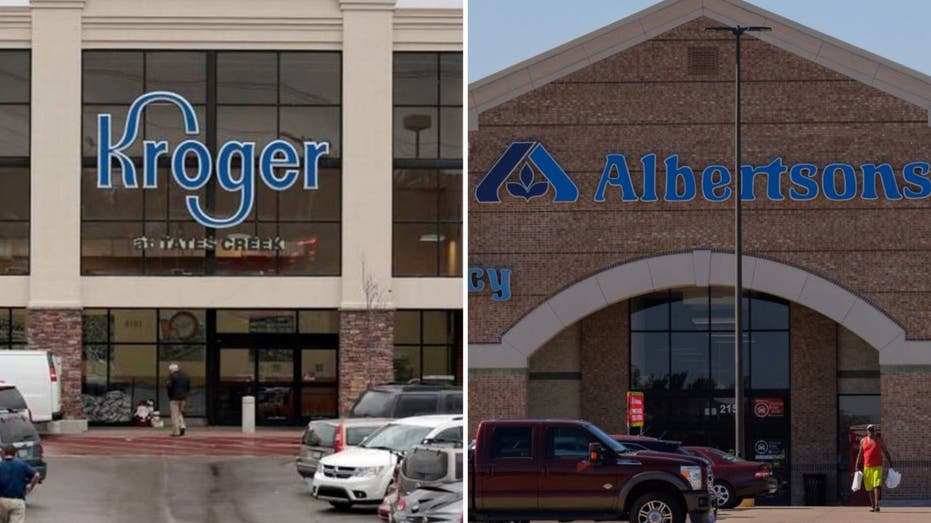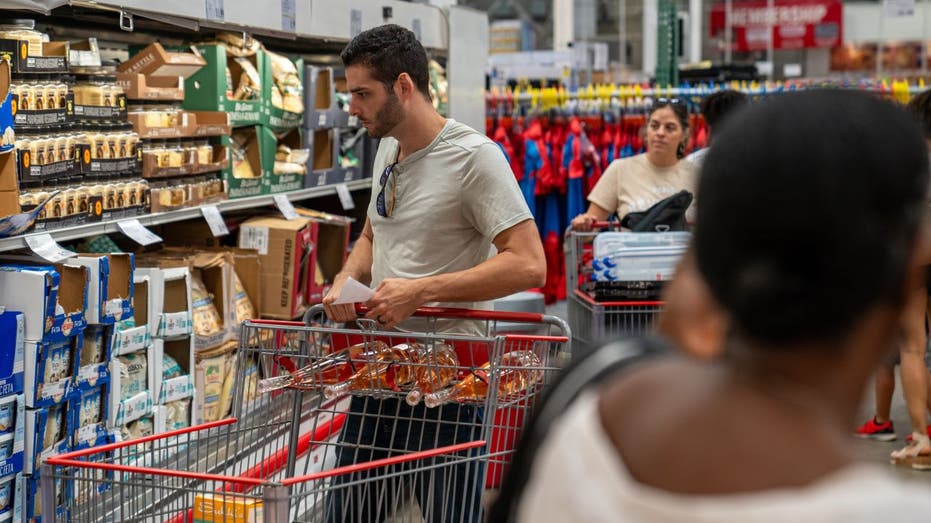National Grocers Association President Greg Ferrara explains factors contributing to the rise in grocery prices in an interview with FOX Business Networks Edward Lawrence.
A trade group representing independent grocery stores is calling for lawmakers and regulators to enforce an existing antitrust law it believes would do more to improve competition and help consumers than the push against alleged “price gouging.”
The National Grocers Association, which represents independent grocers that are privately owned by families or by employees as well as wholesalers in that segment, has called for the law’s use to address pricing competition in the industry. Chris Jones, NGA’s chief government relations officer and counsel, told FOX Business that pricing from suppliers is one of the biggest issues the group’s members face in competing with larger rivals.
“You’ve got a handful of really large, dominant firms in this country who have a lot of power in the market,” he said. “Walmart being the biggest fish in the sea… they’re pretty close to 30% of sales in this country, over $300 billion in food sales in a $1 trillion market. What that means for the supply chain is that they have a tremendous amount of power over suppliers.”
Jones explained that the supply chain clout of larger companies like Walmart helps them get more favorable pricing with suppliers. He went on to say that the proposed Albertsons-Kroger merger, which is the subject of a pending antitrust case, has shown that those two companies believe they need to join forces to better compete against Walmart in the grocery industry.
HERE’S WHY GROCERS ARE REALLY RAISING PRICES
A shopper inside a Dollar General Market store in Saddlebrook, New Jersey, US, on Thursday, Feb. 29, 2024. (Gabby Jones/Bloomberg via Getty Images / Getty Images)
“I think what’s been fascinating about watching the arguments in this Albertsons-Kroger case, it kind of confirms what we have been talking about all along,” Jones explained. “They are getting bigger because that’s the only way that they can compete with Walmart. And so what that really means is they need to have the same kind of power dynamic as Walmart does over suppliers to squeeze them for the kinds of prices and deals that Walmart gets to take the battle to Walmart.”
| Ticker | Security | Last | Change | Change % |
|---|---|---|---|---|
| KR | THE KROGER CO. | 53.21 | +0.71 | +1.35% |
| ACI | ALBERTSONS COMPANIES | 19.42 | -0.20 | -1.02% |
| WMT | WALMART INC. | 77.23 | +0.81 | +1.06% |
“But what does that mean for everybody else in the marketplace? It means that there are two big buyers squeezing the supplier, and all that’s going to mean for us is we’re going to get even less favorable outcomes on price, on availability, on deals, on promotions,” he added.
“So we see it as a major threat to our segment of the industry,” Jones said of the proposed merger. “I think the problem shouldn’t be solved through a large merger. It should be solved through the enforcement of laws that are supposed to limit the ability of Walmart to use its coercive power. A law called the Robinson-Patman Act is the one that comes to mind that’s supposed to help level the playing field — so long as buyers are purchasing in equal or similar quantities, they should be getting the same price.”
FOOD STORE CEO SETS RECORD STRAIGHT ON HARRIS’ PRICE-GOUGING CLAIM

A federal antitrust trial regarding the Albertsons-Kroger merger is ongoing. (Kroger: Charles Bertram/Lexington Herald-Leader/Tribune News Service via Getty Images | Albertsons: Shelby Tauber/Bloomberg via Getty Images / Getty Images)
The Robinson-Patman Act aims to prevent sellers from charging competing buyers different prices for the same commodity or discriminating in providing “allowances” in the form of compensation for advertising and other services.
“This kind of price discrimination may give favored customers an edge in the market that has nothing to do with their superior efficiency,” the Federal Trade Commission (FTC) notes on its website in reference to the law. “Price discriminations are generally lawful, particularly if they reflect the different costs of dealing with different buyers or are the result of a seller’s attempt to meet a competitor’s offering.”
A report by the law firm Morgan Lewis noted that the Department of Justice announced it would stop enforcing the Robinson-Patman Act in 1977 and that the FTC hasn’t brought a case under the law since 2000 — though the law has since been enforced through civil litigation. However, the report noted that the FTC has in recent years expressed an interest in revitalizing the law’s enforcement.

NGA’s Jones said that price discrimination should be regulators’ focus instead of alleged “price gouging.” (Robert Nickelsberg/Getty Images / Getty Images)
Jones said that with respect to the allegations of grocery price gouging that have been made, including in Vice President Harris’ economic platform, “We don’t believe it’s happening. It’s a very specific term that probably plays well in the polls.” He went on to say that policymakers and regulators should rein in their rhetoric and focus instead on enforcing aspects of antitrust law.
“What happens when a major political candidate goes out there and accuses the food and grocery industry of gouging consumers, it really kind of confirms people’s priors,” he said. “The intention, which is what we’ve been told, was really just to focus on the big guys. Even though that’s the intention, most of the consumer backlash is borne by our membership because our costs and retail prices are higher.”
GET FOX BUSINESS ON THE GO BY CLICKING HERE
“It’s had this really kind of negative effect on how consumers view us, and it’s really upset our members who are, because of this margin compression, they’re really doing everything they can to serve their communities,” Jones explained. “So we think it’s price competition that’s the problem and price discrimination, not price gouging.”

